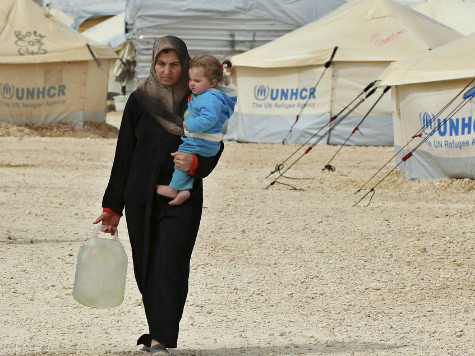The World Food Programme (WFP), a United Nations agency, suspended a food program to Syria due to lack of funds–right before the start of winter. The program provided food for 1.7 million Syrians.
“A suspension of WFP food assistance will endanger the health and safety of these refugees and will potentially cause further tensions, instability and insecurity in the neighbouring host countries,” wrote Ertharin Cousin, WFP executive director. “The suspension of WFP food assistance will be disastrous for many already suffering families.”
WFP reached out to Syrian refugees in Jordan, Lebanon, Turkey, Iraq, and Egypt. The vouchers allowed people to purchase “food in local shops,” but the WFP needs $64 million to continue the vouchers in December. The program provided $800 million “into the economies of refugee hosting countries” since it started when the Syrian civil war broke out in 2011. Over 3.2 million people left Syria, and 7.6 million in the country are displaced.
“As the number of Syrian refugees increases, 3.2 million now, the needs increase, and despite international attention diverted to other crises, Syrians are still very much in need,” said Human Rights member Lama Fakih.
The Syrian refugees already face harsh living conditions. In November, Amnesty International released a report alleging 220,000 out of the 1.6 million refugees live “in the 22 well-resourced camps which are currently operating at full capacity.” In August, the Islamic State (ISIS/ISIL) attacked Arsal, Lebanon, which borders Syria. The UN said that “more than a third of the 1.1 million registered Syrian refugees in Lebanon are in the Bekaa Valley,” which holds Arsal. The shelling between the Lebanese Army and the Islamic State burned down at least one refugee camp.
There are reported cases of Turkish men taking advantage of the women who cross the border. These Turkish “customers” target “young widows or divorcées who have no strong social or family networks.” The women are used for sex or forced marriages, similar to how Islamic State men treat their female prisoners. Male relatives desperate for money will use their female relatives to make ends meet. One woman, Samaa, told The Christian Science Monitor she lives with her family in a rundown hotel. Her husband knows about her “job” but chooses to look the other way because the family needs money.

COMMENTS
Please let us know if you're having issues with commenting.